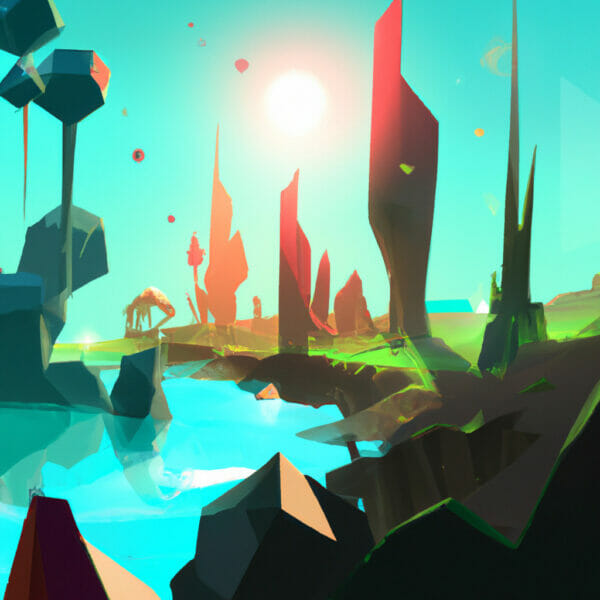Virtual Reality (VR) game development is an exciting and rapidly growing field, offering a wealth of opportunities for developers seeking to create immersive and engaging experiences. With so many courses and certifications available this year, it can be challenging to know where to start.
In this article, we’ll introduce you to some of the best VR development courses and certifications to help you kickstart your career in this dynamic industry, including the beginner-friendly VR Mini-Degree from Zenva Academy.
Table of contents
How Does Virtual Reality Work
Virtual Reality (VR) is an immersive technology that transports users to a simulated environment. By wearing a VR headset and using special controllers, users can interact with the virtual world in a fully immersive way. VR works by tracking the user’s movement and adjusting the displayed content in real-time, creating a sense of presence as if the user is actually part of the virtual environment. Headsets use stereoscopic displays and surround sound to provide a truly immersive experience with depth, spatial awareness, and 3D audio.
How Does VR Improve Games & Apps
VR enhances games and apps in numerous ways, including:
- Immersive experiences: VR creates the feeling that users are part of the game world, leading to more engaging experiences.
- Innovative gameplay: VR enables new types of gameplay and mechanics that are difficult or impossible to achieve with traditional input methods.
- Enhanced learning: Educational apps can leverage VR for experiential learning, enabling users to explore and interact with concepts in a way that is more engaging and effective.
- Increased accessibility: VR applications can adapt to individual users, providing an inclusive experience for people with disabilities or different levels of expertise.
Why Learn VR Development
VR development is an exciting and rapidly growing field in the tech industry. Learning VR development can:
- Jumpstart or enhance your career: Diverse industries, including gaming, education, healthcare, and more, are investing in VR technology, leading to an increasing demand for skilled VR developers.
- Give you a competitive edge: Developing VR skills can set you apart from other developers and increase your value in the job market.
- Expand your creative horizons: VR development offers unique opportunities to create interactive and immersive experiences that push the boundaries of traditional development.
Best Tools for Making VR Projects
There are several tools available for creating VR experiences, including:
- Unity: A powerful game engine and development platform that’s popular for VR development, offering extensive resources, a large asset store, and a huge community.
- Unreal Engine: Another popular game engine, known for its high-fidelity graphics and Blueprint Visual Scripting system, which simplifies the development process for non-programmers.
- Blender: A free and open-source 3D modeling software that can be used to create assets for VR applications.
- VRTK (Virtual Reality Toolkit): A collection of scripts and prefabs for building VR apps in Unity, making it easier to create common VR interactions.
What Skills are Needed to Make VR Projects
To develop VR applications, you should acquire the following skills:
- Basic programming knowledge: Proficiency in a programming language like C# (for Unity) or C++ (for Unreal Engine) is essential.
- Familiarity with a game engine: Both Unity and Unreal Engine are popular choices for VR development. Choose one and become proficient in its features and tools.
- 3D modeling and animation: VR applications require 3D assets and animations. Learn how to create, import and work with them in the game engine of your choice.
- UX and UI design: Designing intuitive and comfortable user interfaces and interactions is crucial for creating engaging VR experiences.
- Optimization: VR apps demand high performance and frame rates. Learn how to optimize your projects to maintain a smooth experience.
In the sections below, we have curated a list of the best resources for learning VR development, from comprehensive courses at Zenva and other sources to hands-on guides and articles. Whether you are a complete beginner or an experienced developer, you’ll find the perfect resource to enhance your skills and embark on an exciting career in VR development.
The Virtual Reality Mini-Degree from Zenva Academy
The Virtual Reality Mini-Degree from Zenva Academy is a comprehensive collection of courses that teaches you how to create virtual reality applications with Unity. The curriculum includes:
– Unity basics
– VR fundamentals
– VR controllers integration
– Avatar creation
– Project-based learning
This VR Mini-Degree is suitable for complete beginners and experienced developers. The courses are flexible, accessible on all modern devices, and taught by Unity-certified experts.
Create with VR by Unity
Create with VR is a course from Unity that teaches you how to design and develop VR applications. This course is suitable for anyone interested in pursuing a career in gaming and the Real Time 3D Industry, featuring:
– Step-by-step tutorials
– Projects with real-world applications
– Quizzes to solidify your skills
– Collaboration with the VR with Andrew YouTube channel
Educators can also incorporate this curriculum into their classrooms.
VR Game Development for Oculus by Unreal Engine
Unreal Engine and Oculus have partnered to offer free online courses in VR game development for Oculus headsets. These courses cover everything from concept to completion, including:
– Preparing content for VR
– Incorporating locomotion, interaction, and sound
– Implementing user interfaces
– Optimizing for performance
– Submitting games to the Oculus Store
Learn to create games for Oculus Quest and Rift S, some of the top-ranked VR headsets available.
How to Code a VR Game by GameDev Academy
This article from GameDev Academy discusses VR game development for beginners, covering topics such as:
– What is VR?
– Types of VR headsets
– Game engines for VR development: Unity and Unreal
– Best practices for VR development
– Reducing motion sickness
This article aims to equip the reader with the information they need to start exploring VR game development.
XR Bootcamp’s VR Game Development Guideline
XR Bootcamp’s article provides a step-by-step guide for game developers looking to break into the VR industry. The guideline covers topics such as:
– Building VR games
– Creating a portfolio to showcase your skills
– Choosing the best game engine for VR development
– Understanding different types of XR experiences (standalone, webXR)
– Tips for importing assets and gameplay mechanics
The article highlights the growing demand for VR developers and offers advice for anyone interested in pursuing this exciting career path.
Conclusion
With so many great resources available, it’s never been a better time to start learning VR game development.
Whether you’re a beginner or an experienced developer, engaging courses like the VR Mini-Degree from Zenva Academy can help you gain the skills you need for a successful career in this exciting field.
Did you come across any errors in this tutorial? Please let us know by completing this form and we’ll look into it!

FINAL DAYS: Unlock coding courses in Unity, Godot, Unreal, Python and more.







